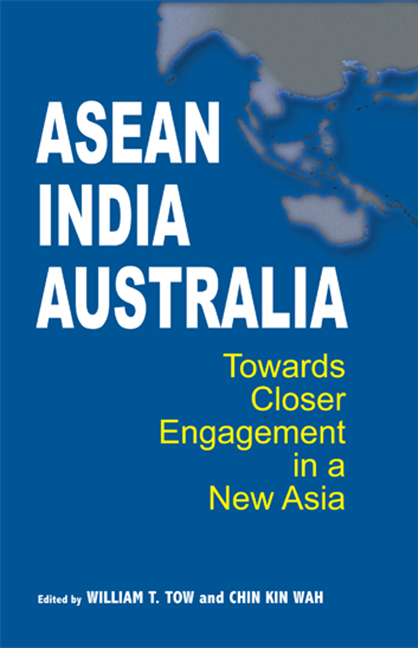Book contents
- Frontmatter
- Contents
- Preface
- Contributors
- List of Abbreviations
- Introduction
- Part I Emerging Regional Security
- Part II Energy Security
- Part III Climate Change
- Part IV Maritime Security
- 11 Australia and Maritime Security in the Northeast Indian Ocean
- 12 ASEAN Maritime Security Perspectives: Enduring Partnerships
- 13 Maritime Security Triangulation of ASEAN-Australia-India: An Indian Perspective
- 14 Governance in Australian Discourse
- 15 ASEAN Charter and Perspectives of Governance and Democracy in Asia
- 16 The Problem of Governance in India
- Part V Law Enforcement/Combating International Crime
- Conclusion
- Bibliography
- Index
15 - ASEAN Charter and Perspectives of Governance and Democracy in Asia
from Part IV - Maritime Security
Published online by Cambridge University Press: 21 October 2015
- Frontmatter
- Contents
- Preface
- Contributors
- List of Abbreviations
- Introduction
- Part I Emerging Regional Security
- Part II Energy Security
- Part III Climate Change
- Part IV Maritime Security
- 11 Australia and Maritime Security in the Northeast Indian Ocean
- 12 ASEAN Maritime Security Perspectives: Enduring Partnerships
- 13 Maritime Security Triangulation of ASEAN-Australia-India: An Indian Perspective
- 14 Governance in Australian Discourse
- 15 ASEAN Charter and Perspectives of Governance and Democracy in Asia
- 16 The Problem of Governance in India
- Part V Law Enforcement/Combating International Crime
- Conclusion
- Bibliography
- Index
Summary
Despite its often stated aims of promoting economic growth, social progress, and Asian cultural development, the Association of Southeast Asian Nations (ASEAN) was originally conceptualized as an association of states engaged in post-independence confidence building. In coming together to form an association, the initial members, among which were the Philippines, Indonesia, Thailand, Malaysia, and Singapore, sought to lay down the basic ground rules of interstate engagement. Those ground rules have continued to define the “ASEAN way”. Among other things they state that each ASEAN member has the right as a sovereign country to carry out its domestic policies free from external interference. This agreement on non-interference marks the overarching principle of ASEAN engagement. Indeed, all ASEAN members are committed to non-confrontation and avoidance of the use of force as a basis for regional cooperation.
This ASEAN stance on non-interference, but also minimal institutionalization, consultation and consensus, non-use of force, and non-confrontation, have characterized the regional association for much of its forty years of existence. However the non-intervention/non-interference principle has come under criticism from the Western world. Western countries have been noticeably vocal against the so-called “soft” ASEAN stance, especially vis-à-vis the issue of promoting human rights and democracy in the region. These criticisms came to a head most recently in October 2007 when the Myanmar military regime cracked down on peaceful demonstrations in Yangon. ASEAN came under criticism for its refusal to suspend Myanmar's regional membership and rejection of proposals of imposing economic sanctions in the country. In remaining firm on its non-confrontational and non-interference policy, ASEAN incurred the displeasure of the European Union (EU), which it had been courting as a trading partner. Some observers have been led to call ASEAN a “talk shop” that is “big on words, but small on action”.
To build up its image as a responsible party in regional and international affairs, the ASEAN member countries seriously renewed their efforts at conceptualizing and instituting an ASEAN Charter. The Charter, which acts as a kind of “constitution” for ASEAN, was eventually signed by the heads of government at the 13th ASEAN Summit in November 2007 in Singapore, and by the end of 2008, has been rectified by all ASEAN countries.
- Type
- Chapter
- Information
- ASEAN-India-AustraliaTowards Closer Engagement in a New Asia, pp. 256 - 268Publisher: ISEAS–Yusof Ishak InstitutePrint publication year: 2009



